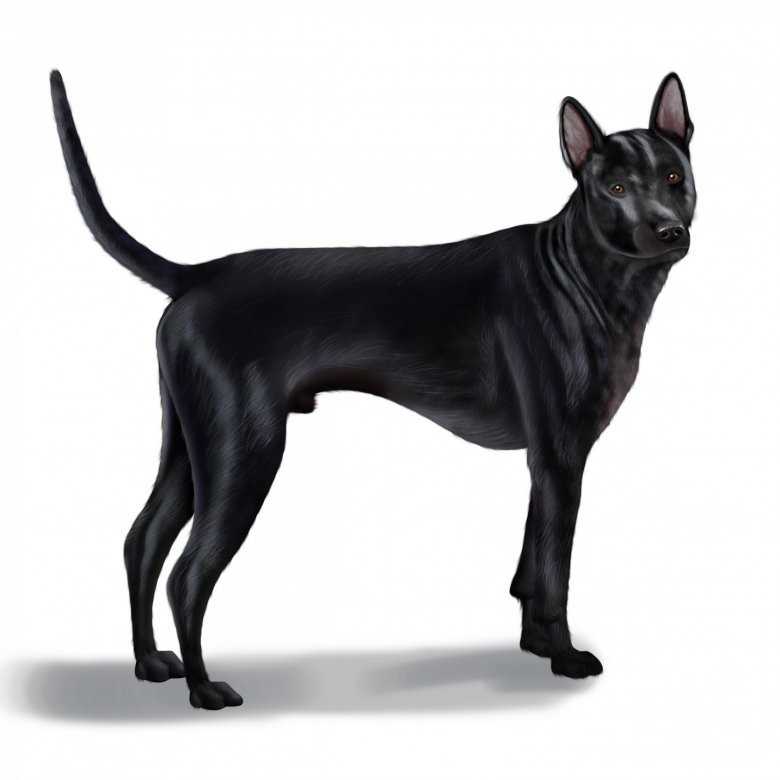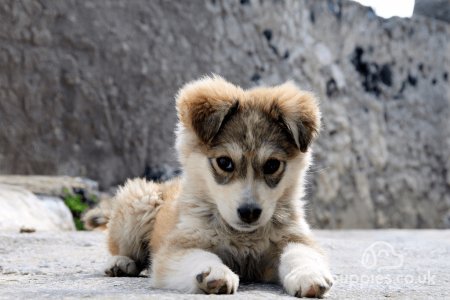Thai Ridgeback (Thai Ridgeback Dog, TRD, Mah Thai, Thai Dog, Mah Thai Lung Arn)
Overview
Exceedingly rare and amongst the purest breeds in the world, the Thai Ridgeback is a handsome treasure in the right hands. There are only three known breeds in the world with a distinctive ridged back, the other two being the Phu Quoc Ridgeback and the Rhodesian Ridgeback.
It is believed that the Thai Ridgeback was originally kept as a hunting dog in his native Thailand, but they have also been known to dutifully serve as guard dogs for escorting carriages along the eastern coastline of Thailand.
In the UK, this breed is relatively unpopular, perhaps due to a combination of his rarity and his challenging temperament.
Physical Appearance
The first thing one will notice about the medium-sized Thai Ridgeback is his long ridge of longer hair extending from the neck to where the tail meets the body. Their long bodies covered in short hair (except at the ridge) showcases their superb musculature and exude a sense of alertness.
Their eyes are almond-shaped, dark brown, but sometimes amber-coloured if their coat colour is blue. Their ears are well-set on either side of the skull, triangular in shape, and firmly pointing forwards. Their tails begin thick at the base and taper down to a point and are carried vertically and slightly curved when the dog is alert.
Coat colours include solid colours such as black, red, blue, and isabella. For red-coloured Thai Ridgebacks, a black mask is preferred.
The breeds that resemble the Thai Ridgeback the most are the Phu Quoc Ridgehound (which is a little smaller in size) and the Rhodesian Ridgeback. To a lesser extent, they also resemble other spitz-type breeds.
How big do Thai Ridgeback dogs get?
Character Traits
The temperament of the Thai Ridgeback is challenging to describe, given that there are so few and their closest relatives, namely other ridgebacks such as the Phu Quoc Ridgeback, are equally as unpopular and therefore little is known about their behaviour and temperament in the hands of an owner here in the UK.
Nevertheless, they have shown to be an intelligent breed that are loyal, energetic, and with a playful side, especially as cute little puppies. On the other hand, they are not particularly well-known for being affectionate and would rather do their own thing. Moreover, they tend to be protective and actively defend their owners and their property, making them suitable as guard dogs (although other, more well-known guard dog breeds tend to perform these duties far better).
Lastly, it is important to note that Thai Ridgebacks are notoriously challenging to train. This doesn’t mean that they are incapable of learning discipline and good behaviour but rather that they have a stubborn, sometimes independent streak to them.
Are Thai Ridgeback dogs intelligent? Yes.
Are Thai Ridgeback dogs affectionate? No.
Do Thai Ridgeback dogs have high or low energy levels? High energy.
Are Thai Ridgeback dogs loyal? Yes.
Are Thai Ridgeback dogs playful? Yes.
Are Thai Ridgeback dogs aggressive? No, but they can be defensive.
Are Thai Ridgeback dogs easy to train? No.
Are Thai Ridgeback dogs good guard dogs? They are commonly used as guard dogs, despite not being the best at this particular duty.
Ability to Socialise
A rare breed such as the Thai Ridgeback does not tend to endure socialisation much at all, and this is perhaps due to his ancient origins in Thailand whereby contact with other small house pets and dogs was not common at all.
Around other dogs, they can display dominance and perhaps even jealousy towards the affection given to the other dog by the owner. Similarly, Thai Ridgebacks don’t tend to get along well at all with other pets such as cats. In summary, they ought to be the only pet in the home.
Around children, they can be boisterous and would not be an ideal fit for a home with young children. Towards strangers, they tend to be defensive and cautious.
All in all, socialisation is important with all breeds of dogs to encourage good behaviour and to foster a loving companionship that is harmonious. With the Thai Ridgeback, however, it’s only recommended to have one in a home without pets or small children so that they can receive their owner’s full attention.
Do Thai Ridgeback dogs get along with other pets? Not at all.
Do Thai Ridgeback dogs get along with other dogs? No.
Are Thai Ridgeback dogs good with kids? Yes.
Are Thai Ridgeback dogs good with strangers? No, they are defensive and cautious towards strangers.
Lifestyle Suitability
Thai Ridgebacks are suitable for a very select group of owners that are willing to learn and appreciate their unique temperament. As with their difficulties in socialisation, Thai Ridgebacks are equally unsuitable for first-time owners, apartment living environments, and in cold climates. In Britain, the colder winters (compared to Thailand) are not at all ideal, although they do endure our warm summers quite well.
It is best to raise a Thai Ridgeback in a home with ample space, including a garden or field which they can claim as their own territory and defend dutifully against any invaders.
For prospective owners willing to learn about this rare breed and his specific (demanding) requirements, the Thai Ridgeback can pay back the patience and effort in spades.
Are Thai Ridgeback dogs good for first-time owners? No.
Are Thai Ridgeback dogs hypoallergenic? No.
Are Thai Ridgeback dogs prone to drooling? No, not much.
Are Thai Ridgeback dogs a good breed for apartment living? Not really, they prefer larger homes.
Do Thai Ridgeback dogs shed a lot? Yes, a moderate amount.
Do Thai Ridgeback dogs bark a lot? No, not much.
Can Thai Ridgeback dogs be left alone at home? Yes, but only for moderate lengths of time.
Can Thai Ridgeback dogs handle the heat? Yes, they prefer warm climates.
Can Thai Ridgeback dogs handle cold temperatures? Not too cold.
Are Thai Ridgeback dogs sensitive to loud noises? Yes.
General Health & Health Issues
It is believed that the Thai Ridgeback has excellent health ratings compared to other breeds. His superb health mostly has to do with the fact that the breed was, until relatively recently, only bred through natural selection in Thailand, thus breeding out any inherited health problems and promoting a continuously healthy breed over the centuries.
On account of the breed’s rarity, not much is known about their health profile, although they have been known to suffer from a few health problems.
Some common problems include:
Dermoid sinus: a genetic skin condition known to occur in many breeds, including the Thai Ridgeback, dermoid sinus can cause irritation and must be removed by surgical excision;
Hip dysplasia: common to many breeds, especially larger breeds, hip dysplasia can cause anything from mild discomfort to full-on limpness or lameness of the leg(s).
How long do Thai Ridgeback dogs live? - 12-15 years
Exercise & Play Time
Thai Ridgebacks require anywhere from around one to two hours of exercise every day in order to remain happy and healthy. As puppies, it’s important not to overexert your Thai Ridgeback and to adjust playtime and exercise time to meet their individual needs.
As a breed originally used in the marshy jungles of eastern Thailand, Thai Ridgebacks certainly love to go for a swim in shallow watercourses and to engage their natural prey drive and protective instincts around their owners. If your Thai Ridgeback jumps in for a swim, be sure to dry him off adequately before letting him back in the house.
How much exercise does a Thai Ridgeback dog need? - At least 1-2 hours per day
Do Thai Ridgeback dogs like water play? Yes, but always keep an eye on them.
Nutrition & Feeding
As a lean, muscular, and energetic breed, Thai Ridgebacks consume a fair bit of food every day. It’s important to promote good, healthy development by providing nothing short of high-quality dog food rich in minerals, vitamins, and nutrients.
Owners that wish to put their Thai Ridgeback on an alternative diet, such as cold-pressed or raw food should consult with their veterinarian beforehand to ensure that such a diet is appropriate.
Moreover, break up feeding into 3-4 sessions rather than all at once. They are not particularly known for being picky eaters or overindulgers, but these are potential problems best avoided altogether by regimented feeding sessions at a predictable time every day.
Are Thai Ridgeback dogs prone to weight gain? Not particularly.
How much should I feed a Thai Ridgeback puppy? About 180-390g per day, in 3-4 sessions.
How much should I feed an adult Thai Ridgeback dog? About 210-340g per day, in total.
Care & Maintenance
The excellent, short, natural coats of fur on a Thai Ridgeback are easy to care for and thus little grooming is required apart from the occasional brushing, cleaning, and drying off.
Emotionally, Thai Ridgebacks are fairly demanding and do best when there is always someone home to accompany them, even if they do like their independence.
- Grooming: once a week, brush your Thai Ridgeback and follow up with chamois leather to keep his coat glossy and lush. Have his ears and eyes inspected frequently for possible signs of infection.
- Emotional care: while as a guard dog Thai Ridgebacks can remain solitary for moderate lengths of time, they depend on the bond of loyalty they foster with their owners. Don’t leave him alone for too long; perhaps a few hours at most.
History of the Thai Ridgeback
Ancient artefacts indicate that the Thai Ridgeback, or at least a similar or predecessor breed, inhabited the region of Siam in today’s Vietnam (then Thailand) for well over a thousand years. Therefore, it is highly likely that the Phu Quoc Ridgeback and the Thai Ridgeback share similar ancestry as they both originated in more or less the same region and share similar appearance (the Thai Ridgeback is marginally larger than the Phu Quoc Ridgeback).
This breed was used for hunting large prey, including wild boar tapirs, deer, and waterfowl in the marshy jungle regions of eastern Thailand. Moreover, they were prized for being superb carriage guardians as villagers and traders trod over the difficult terrain for centuries.
It is likely on account of the poor transport infrastructure that the Thai Ridgeback remained for possibly over a thousand years relatively unknown outside of Thailand, which also ensured that the breed remained pure and only bred through natural selection until only very recently.
This breed is recognised by various kennel clubs such as the American Kennel Club and Federation Cynologique Internationale.
Interesting Facts About Thai Ridgeback Dogs
This breed is highly regarded by the Thai government and military as a status symbol;
The first Thai Ridgeback to be exported from Thailand was a blue male, Hintza, who was sent to Holland;
This breed is one of only three known breeds around the world to have a ridge on his back, the other two being the Rhodesian Ridgeback and the Phu Quoc Ridgeback..
Getting a Thai Ridgeback Puppy
For anyone wishing to purchase or adopt a Thai Ridgeback puppy, the unfortunate reality is that their extreme rarity can make obtaining one near impossible, or at least very costly. We nevertheless encourage you to read our buying guide and if you wish to purchase a Thai Ridgeback to only purchase from reputable breeders here in the UK.
How much does a Thai Ridgeback cost to buy? - At least £1,500.
How much does a Thai Ridgeback cost to feed? - An adult Thai Ridgeback costs about £1.00-£1.20 per day to feed.
How much does insurance for a Thai Ridgeback cost? - About £55-£75 per month.
Sensible alternatives to purchasing a new Thai Ridgeback puppy include rescue and adoption.
Additional resources can be found via Thai Ridgeback registries and associations such as:











